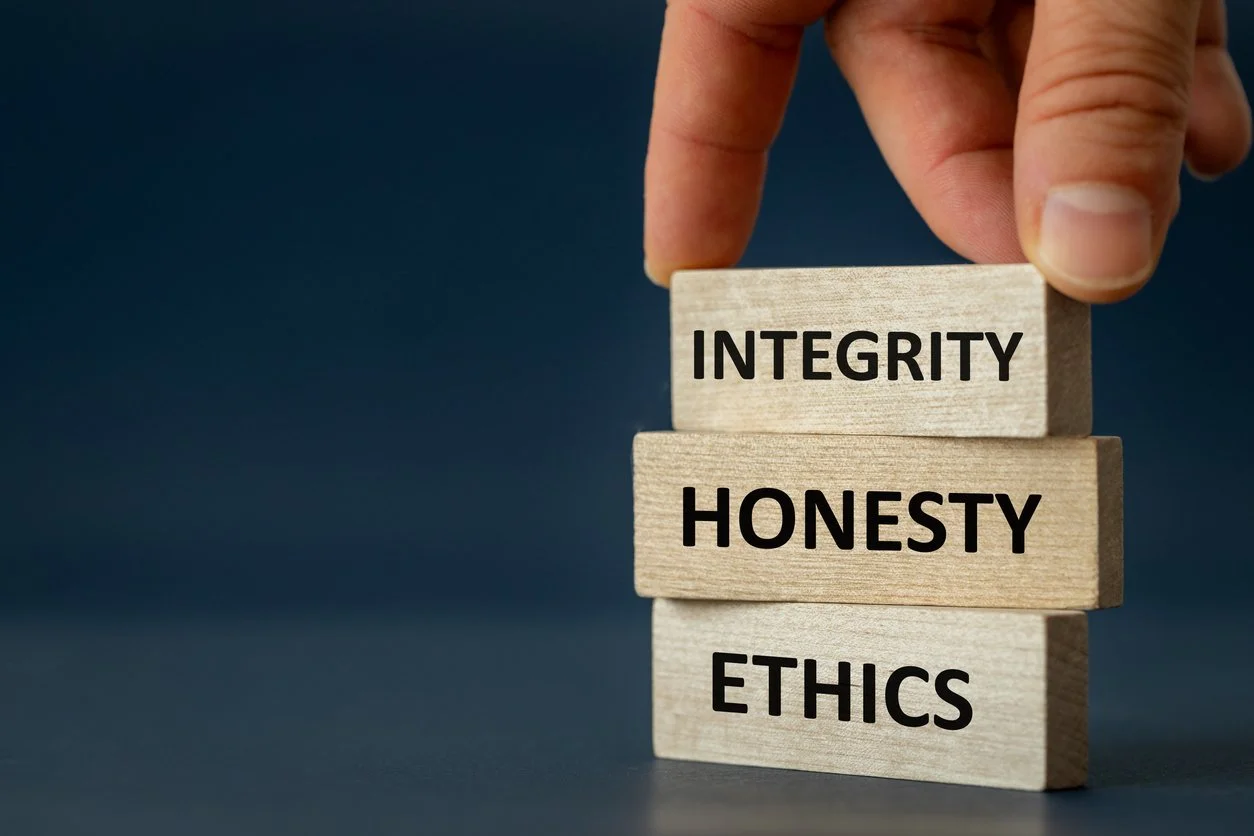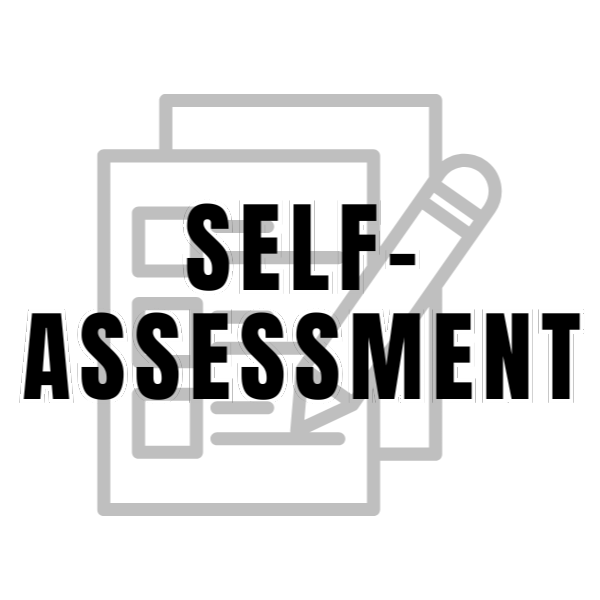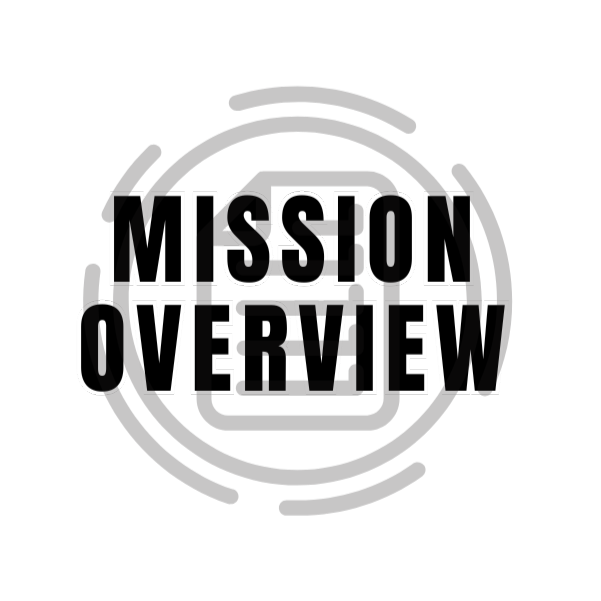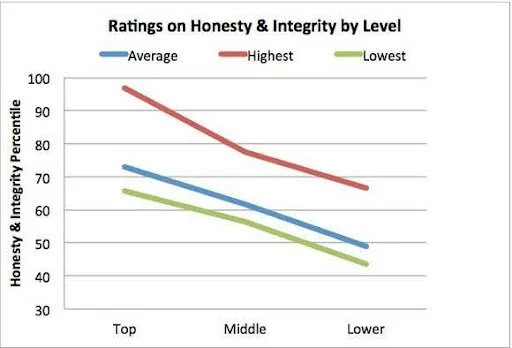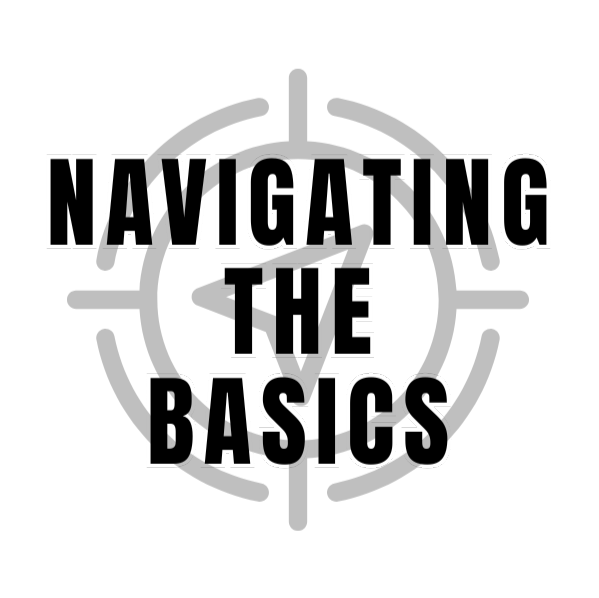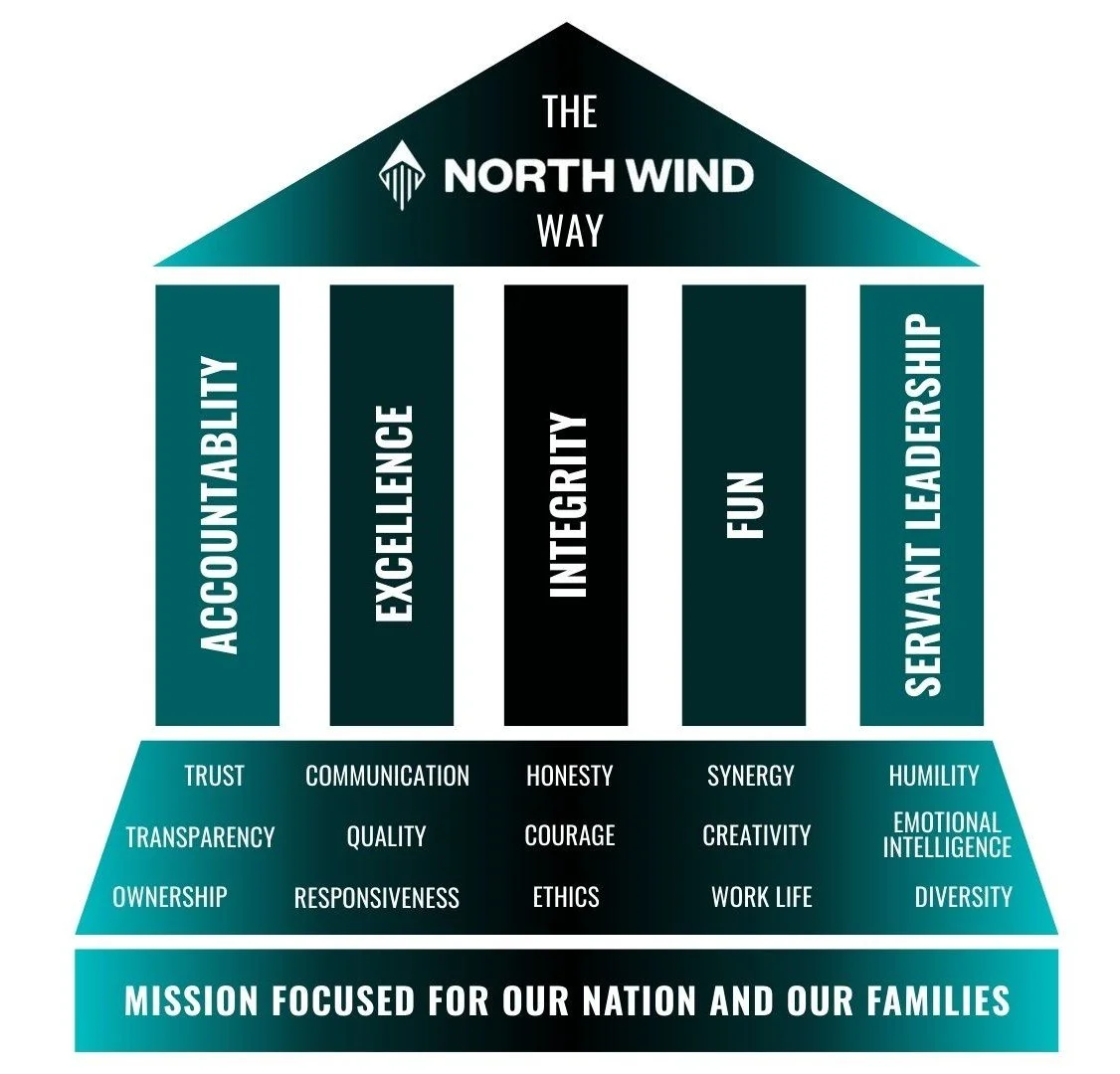Embracing Authentic Integrity
Integrity is the alignment between what you value and how you behave. It develops over time through choices that reflect your standards, especially when those choices are challenging or unpopular. Leaders who act with integrity demonstrate their beliefs through action rather than words.
Authenticity means presenting yourself without pretense. It requires admitting when you don’t have an answer and allowing others to see when you are facing uncertainty. People respect leaders who are honest about what they know and what they don’t, rather than those who pretend to know it all.
In leadership, authentic integrity means living your values through consistent words, actions, and decisions. Honesty becomes visible through how you communicate, how you follow through, and how you respond when things do not go as planned. When your behavior matches your principles, people learn they can count on you.
At North Wind, authentic integrity appears in our daily choices: following through on commitments, speaking truthfully, and upholding the standards you expect from others. When leaders act with this kind of honesty, they create an environment where people feel respected, supported, and clear about what is expected of them.
Self-Assessment:
Embracing Authentic Integrity
Please take a few moments to contemplate the following self-reflection questions. Where can you identify opportunities for personal growth in your leadership?
Do I consistently follow through on my promises and commitments?
Can people rely on me to be dependable and trustworthy?
Am I honest and transparent in my communications, even when the truth is difficult to share?
Do I openly admit my mistakes and take responsibility for my actions?
Are my actions and decisions aligned with my personal values?
Do I model integrity and ethical behavior in a way that others can trust and respect?
Do I regularly reflect on my behavior and seek feedback from others to improve my integrity?
Do I maintain my integrity under pressure or in difficult situations?
Remember, this self-assessment is just a starting point for understanding your knowledge of Embracing Authentic Integrity as a leader. It's essential to reflect on your responses and actively work on areas where improvement is needed. Additionally, seeking feedback from others and working with your ECFL Leadership Coach can provide valuable insights into your strengths and weaknesses.
Integrity requires honesty and a consistent upholding of strong moral and ethical values. To better understand the influence of leadership on ethics and honesty, consider research shared by Harvard Business Review. The study analyzed data from 5,268 leaders across five organizations, categorized by management level (top, middle, and lower). The findings, based on 360-degree performance assessments, revealed a clear trend: ratings of honesty and integrity declined at each successive level, with notable differences between the highest- and lowest-rated organizations.
Two key points stand out from this research. First, managers tend to overestimate their own integrity. Second, they often assume higher levels of integrity in their direct reports than those employees acknowledge themselves.
The main lesson for leaders is that people are not reliable self-reporters, and integrity should never be taken as a given. Effectiveness does not always reflect honesty, and no one should receive a pass for productivity or seniority. Leaders must take deliberate care to communicate expectations of honesty and establish systems that uphold the level of integrity they expect from their teams. They should also examine their own standards of integrity and honesty and consider how well those standards are communicated and demonstrated each day.
As leaders advance in their positions, the associated risks and consequences escalate, while many of the checks and balances that once constrained them disappear. They gain greater access to resources and authority, yet fewer people are willing to raise concerns or challenge their actions. Because leadership decisions often focus on long-term goals, the effects are not always immediately visible.
“Authenticity is the alignment of head, mouth, heart, and feet—thinking, saying, feeling, and doing the same thing—consistently. This builds trust, and followers love leaders they can trust.”
Remember that integrity is demonstrated through small, everyday actions, such as the words you choose and the way you respond in daily interactions. As you read the following statements, reflect on your own level of honesty and integrity. Use the mental scale of always, sometimes, or not very often as you consider each one.
Do you?
Give credit where credit is due.
Communicate honestly and openly with colleagues.
Maintain a strong sense of right and wrong, and strive to do what is right.
Set and uphold high personal standards of integrity.
Show up ready to work and stay focused throughout the day.
Keep your word on all matters.
Model honesty for your peers, teams, and family.
Return calls and emails promptly.
Make only the promises you can keep.
Show respect for others’ ideas.
Collaborate as a team and recognize others’ contributions..
Or do you?
Make promises you may not be able to fulfill.
Let integrity take a backseat when pursuing goals.
Arrive late, leave early, or give less than full effort.
Exaggerate your contributions to appear more valuable.
Hold yourself to different ethical standards than your organization.
Justify questionable behavior when you believe the outcome is worth it.
Use work time or resources for personal benefit.
How did you do?
Donnie Smith, former CEO of Tyson Foods, emphasized the importance of using simple and honest language, especially when describing organizational performance and responding to constructive criticism. During challenging times, it can be tempting to spin bad news in a positive direction; however, effective leaders build credibility by consistently discussing both the good and the bad of their company rather than distorting the truth. The keyword in his message is consistency, because repeated honesty over time is what gives leaders authenticity. This alignment between words and actions reflects authentic integrity.
“Authenticity is the daily practice of letting go of who we think we’re supposed to be and embracing who we are.”
When leaders create an environment that welcomes and encourages respectful disagreement, they are more likely to maintain high morale and strong relationships across the team. Refusing to accept pushback limits understanding, weakens decision-making, and isolates valuable perspectives.
Leaders need honest input from their teams during both periods of success and times of challenge. This only happens when the fear of retaliation is removed. Leaders must set the standard by intentionally creating opportunities for feedback, even when the message is difficult to hear. Approaching honesty and feedback in this way encourages deeper insight and stronger, more thoughtful decision-making across the organization.
Did you know?
Many companies now include integrity tests in their pre-hire process. These assessments are designed to evaluate a candidate’s reliability, honesty, and ethical judgment, helping employers understand how likely someone is to engage in unethical behavior such as lying, cheating, or stealing. Used for all new employees, these assessments reinforce a company’s commitment to honesty and remind current employees of what leadership values most. The message is clear: honesty remains a fundamental part of a company’s culture and success.
Authentic integrity develops through awareness and deliberate practice. It takes consistency, reflection, and a willingness to align actions with values in every situation. The following best practices focus on strengthening honesty in daily leadership and demonstrating integrity through consistent action.
Best Practices for Cultivating Authentic Integrity
Take Responsibility for Your Actions: Follow through on commitments and meet deadlines without excuses. When an error occurs, acknowledge it directly, correct it, and communicate what steps you’re taking to prevent a repeat. Keep your word in both small and large matters so others can depend on you.
Be Transparent in Communication: Explain decisions clearly, including the reasoning behind them. Provide updates when circumstances change so people stay informed and aligned. When delivering difficult news, speak honestly and focus on solutions rather than deflecting or avoiding responsibility.
Keep Your Promises: Commit only to what you can reasonably deliver. If priorities shift, let people know early and outline an updated plan. Confirm agreements in writing when appropriate to maintain clarity and accountability.
Acknowledge Mistakes Openly: Admit when you’re wrong without hesitation or excuses. Fix the issue promptly and share what you’ve learned to help others avoid the same challenge. Ask for input if a solution requires collaboration or affects multiple people.
Treat Everyone with Fairness and Consistency: Apply the same expectations to all, regardless of title or relationship. Review your decisions for bias, and verify that similar situations receive similar outcomes. Use transparent criteria when evaluating performance or assigning opportunities.
Protect Confidentiality: Keep sensitive information secure and discuss it only with those who need to know. Avoid sharing private details in group settings or casual conversations. When in doubt, ask permission before disclosing information that involves others.
Make Ethically Sound Decisions: Pause before making a difficult choice to consider how it aligns with your values and the organization’s principles. Gather facts from multiple perspectives and avoid shortcuts that could create long-term harm. Document major decisions to ensure transparency.
Seek Feedback Regularly: Ask for input after major projects or decisions. Request specific examples to better understand how your actions are perceived. Follow up with visible adjustments that show you listened and are willing to improve.
Most leaders don’t set out to be dishonest; they make small compromises, justify exceptions, or convince themselves that one inconsistency won’t matter. Yet those moments add up, and over time, credibility fades. Authentic integrity means recognizing these moments as they happen. When you feel the pull to soften the truth, avoid a hard conversation, or hold others to expectations you’re not meeting yourself, that discomfort is a signal that your integrity is being tested.
At North Wind, the leaders who uphold genuine integrity are the ones who pause in those moments and choose the harder path, sacrificing their short-term comfort for the long-term trust that integrity creates. Start noticing where those tests appear in your own leadership, and decide what you’re willing to do about them.
Reflection Questions
When have I felt the pull to take an easier path instead of the honest one, and what did I learn from that moment?
What small compromises do I justify that may weaken my integrity over time?
In what ways do I model honesty through my daily choices and communication?
Elevate your understanding of Embracing Authentic Integrity by taking flight with the following resources. Use this opportunity to navigate, uncover, and expand the horizons of your leadership influence.
Honesty in the Workplace
Ankit Jain
The Role of Honesty in Success (And Why Cutting Corners is a Bad Idea)
Kate Vitasek
The Data’s In: Honesty Really Does Start at the Top
Jack Zenger and Joseph Folkman
(if you don’t have access to HBR)

